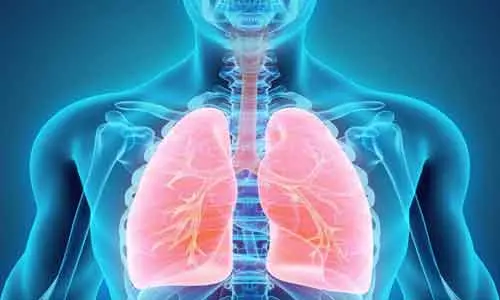- Home
- Medical news & Guidelines
- Anesthesiology
- Cardiology and CTVS
- Critical Care
- Dentistry
- Dermatology
- Diabetes and Endocrinology
- ENT
- Gastroenterology
- Medicine
- Nephrology
- Neurology
- Obstretics-Gynaecology
- Oncology
- Ophthalmology
- Orthopaedics
- Pediatrics-Neonatology
- Psychiatry
- Pulmonology
- Radiology
- Surgery
- Urology
- Laboratory Medicine
- Diet
- Nursing
- Paramedical
- Physiotherapy
- Health news
- Fact Check
- Bone Health Fact Check
- Brain Health Fact Check
- Cancer Related Fact Check
- Child Care Fact Check
- Dental and oral health fact check
- Diabetes and metabolic health fact check
- Diet and Nutrition Fact Check
- Eye and ENT Care Fact Check
- Fitness fact check
- Gut health fact check
- Heart health fact check
- Kidney health fact check
- Medical education fact check
- Men's health fact check
- Respiratory fact check
- Skin and hair care fact check
- Vaccine and Immunization fact check
- Women's health fact check
- AYUSH
- State News
- Andaman and Nicobar Islands
- Andhra Pradesh
- Arunachal Pradesh
- Assam
- Bihar
- Chandigarh
- Chattisgarh
- Dadra and Nagar Haveli
- Daman and Diu
- Delhi
- Goa
- Gujarat
- Haryana
- Himachal Pradesh
- Jammu & Kashmir
- Jharkhand
- Karnataka
- Kerala
- Ladakh
- Lakshadweep
- Madhya Pradesh
- Maharashtra
- Manipur
- Meghalaya
- Mizoram
- Nagaland
- Odisha
- Puducherry
- Punjab
- Rajasthan
- Sikkim
- Tamil Nadu
- Telangana
- Tripura
- Uttar Pradesh
- Uttrakhand
- West Bengal
- Medical Education
- Industry
Early administration of dexamethasone effective for ARDS treatment: Lancet

Spain: Early administration of dexamethasone could reduce the duration of mechanical ventilation and overall mortality in patients with established moderate-to-severe acute respiratory distress syndrome (ARDS), according to a recent study published in the journal Lancet Respiratory Medicine.
ARDS is a type of respiratory failure that occurs due to fluid build-up in the tiny, elastic air sacs (alveoli) in the lungs. It is characterized by the rapid onset of widespread inflammation in the lungs. Fluid accumulation keeps the lungs from filling with enough air resulting in less oxygen reaching the bloodstream. This deprives the organs of the oxygen required for their functioning. The main symptom of ARDS ids severe shortness of breath that usually develops within a few days after the precipitating injury or infection.
For ARDS patients there is no proven pharmacological treatment. The efficacy of corticosteroids in ARDS remains controversial. Jesus Villar, Instituto de Salud Carlos III, Madrid, Spain, and colleagues aimed to assess the effects of dexamethasone in ARDS, which might change pulmonary and systemic inflammation and result in a decrease in duration of mechanical ventilation and mortality.
For the purpose, the researchers performed a multicentre, randomized controlled trial in a network of 17 intensive care units (ICUs) in teaching hospitals across Spain in patients with established moderate-to-severe ARDS -- defined by a ratio of partial pressure of arterial oxygen to the fraction of inspired oxygen of 200 mm Hg or less assessed with a positive end-expiratory pressure of 10 cm H 2O or more and FiO 2 of 0·5 or more at 24 h after ARDS onset.
Patients with brain death, terminal-stage disease, or receiving corticosteroids or immunosuppressive drugs were excluded. Eligible patients were randomly assigned to receive immediate treatment with dexamethasone (intravenous dose of 20 mg once daily from day 1 to day 5, which was reduced to 10 mg once daily from day 6 to day 10) or continued routine intensive care (control group). Patients in both groups were ventilated with lung-protective mechanical ventilation.
The primary outcome was the number of ventilator-free days at 28 days, defined as the number of days alive and free from mechanical ventilation from the day of randomization to day 28. The secondary outcome was all-cause mortality 60 days after randomization.
In total 277 patients were enrolled between March 28, 2013, and Dec 31, 2018. 130 patients were in the dexamethasone group and 138 in the control group. The trial was stopped by the data safety monitoring board due to the low enrolment rate after enrolling more than 88% (277/314) of the planned sample size.
Key findings of the study includes:
· The mean number of ventilator-free days was higher in the dexamethasone group than in the control group (between-group difference 4·8 days.
· At 60 days, 29 (21%) patients in the dexamethasone group and 50 (36%) patients in the control group had died (between-group difference −15·3%).
· The proportion of adverse events did not differ significantly between the dexamethasone group and the control group.
· The most common adverse events were hyperglycemia in the ICU (105 [76%] patients in the dexamethasone group vs 97 [70%] patients in the control group), new infections in the ICU (eg, pneumonia or sepsis; 33 [24%] vs 35 [25%]), and barotrauma (14 [10%] vs 10 [7%]).
"Early administration of dexamethasone could reduce the duration of mechanical ventilation and overall mortality in patients with established moderate-to-severe ARDS," concluded the authors.
The study, "Dexamethasone treatment for the acute respiratory distress syndrome: a multicentre, randomised controlled trial," is published in The Lancet Respiratory Medicine.
Dr Kamal Kant Kohli-MBBS, DTCD- a chest specialist with more than 30 years of practice and a flair for writing clinical articles, Dr Kamal Kant Kohli joined Medical Dialogues as a Chief Editor of Medical News. Besides writing articles, as an editor, he proofreads and verifies all the medical content published on Medical Dialogues including those coming from journals, studies,medical conferences,guidelines etc. Email: drkohli@medicaldialogues.in. Contact no. 011-43720751


